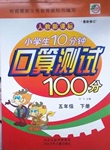题目内容
Mothers are talkative. It’s perfectly _________ to get angry with your mother sometimes.
A.mad B.good C.ordinary D.normal
D

 小学生10分钟口算测试100分系列答案
小学生10分钟口算测试100分系列答案Has Tiger Mom gone soft? One year after the release of her book, Battle Hymn of the Tiger Mother, Amy Chua is back in the spotlight, reflecting on how overnight infamy (恶名) affected her life, her family and her parenting.
“I have changed a lot,” she told the Huffington Post. “In October, we had 30 kids at our house! We have hosted parties with lots of food and music.”
Last January, the Wall Street Journal published an excerpt (节选) from Chua’s book with the headline “Why Chinese Mothers Are Superior”. In the excerpt, Chua described how her daughters were never allowed to have sleepovers (在外过夜的儿童聚会), appear in school plays, or earn any grade lower than an A. Chua, an author and professor at Yale Law School, spent much of 2011 on the defensive. In fact, many of her interviews seemed to lend fuel to her critics’ fire.
Now, with the book out in paperback, she said, “I put passages in the book and used very harsh words that I regret. Everybody has those moments you wish you could take back.”
For those who still read Battle Hymn as an advice guide, Chua argues that so-called tiger parenting should be employed mainly during a child’s early years, ideally between the ages of 5 and 12. These “super-strict parenting tactics” are not meant for all ages. Remaining strict after middle school makes you a helicopter parent, according to Chua. And she is quick to point out how different that is from being a tiger mom.
“By the time kids get to high school, helicopter parents are hiring all these tutors, carrying their kids’ sports bags. I never checked older daughter Sophia’s papers because I knew she knew how to sit down and focus,” Chua said.
As for younger daughter Lulu, 15, the rebel for whom the book was written, Chua has really backed off. Instead of forcing Lulu to practise violin for hours a day—the source of their biggest fights, Chua “let her give that up”. “My compromise (妥协) is that I’m going to still be as strict academically, but in exchange she has a lot of social freedom. Lulu has had four sleepovers in the last two months!” Chua said. Chua predicts she’ll only get more easygoing with age.
【小题1】What does the passage mainly tell us?
| A.Tiger Mom has changed and wants to be soft. |
| B.Tiger Mom persuaded readers to follow her example. |
| C.How Battle Hymn of the Tiger Mother came out. |
| D.How Tiger Mom became the worldwide spotlight. |
| A.Tiger Mom became stricter with her children |
| B.Tiger Mom was thought highly by the public |
| C.Tiger Mom’s life and family were influenced |
| D.Tiger Mom became wealthy and easygoing |
| A.whether she could do well at school |
| B.when she could have sleepovers |
| C.what should be written in the book |
| D.how long she practiced the violin |
People in the United States honour their parents with two special days: Mother’s Day, on the second Sunday in May, and Father’s Day, on the third Sunday in June.These days are set aside to show love and respect for parents. They raise their children and educate them to be responsible citizens. They give love and care.These two days make us think about the changing roles of mothers and fathers. More mothers are now working outside home. More fathers must help with the children care.
These two special days are celebrated in many different ways. On Mother’s Day, people wear carnations(康乃馨). A red one symbolizes(象征) a living mother, while a white one shows the mother is dead. Many people attend religious services to honour parents. It is also a day when people whose parents are dead visit cemetery ( 墓地). On these days, families get together at home, as well as in restaurants. They often have outdoor barbecues for Father’s Day. These are days of fun and good feelings and memories.
Another tradition is to give cards and gifts. Children make them in school. Many people make their own presents. These are valued more than the ones bought in stores. It is not the value of the gift that is important, but it is the thought that counts. Greeting card stores, florists, candy makers, bakeries, telephone companies and other stores do a lot of business during these holidays.
【小题1】Which of the following is NOT a reason for parents show love and respect for parents?
| A.Parents bring up children |
| B.Parents give love and care to children |
| C.Parents educate children to be good persons |
| D.Parents pass away before children grow up |
| A.It has only two kinds of colours |
| B.It refers to the special clothes people wear on Mother’s Day or Father’Day |
| C.It’s a kind of flower showing love and best wishes. |
| D.People can wear carnations only on the second Sunday in May |
| A.Mother’s Day and Father’s Day are both in May |
| B.Fewer women worked outside the home in the past |
| C.Not all the children respect their parents |
| D.Fathers are not as important as mothers |
| A.They sell flowers |
| B.They offer enough room for having family parties |
| C.They sell special clothes for Mother’s day |
| D.They make bread or pastry(点心) |